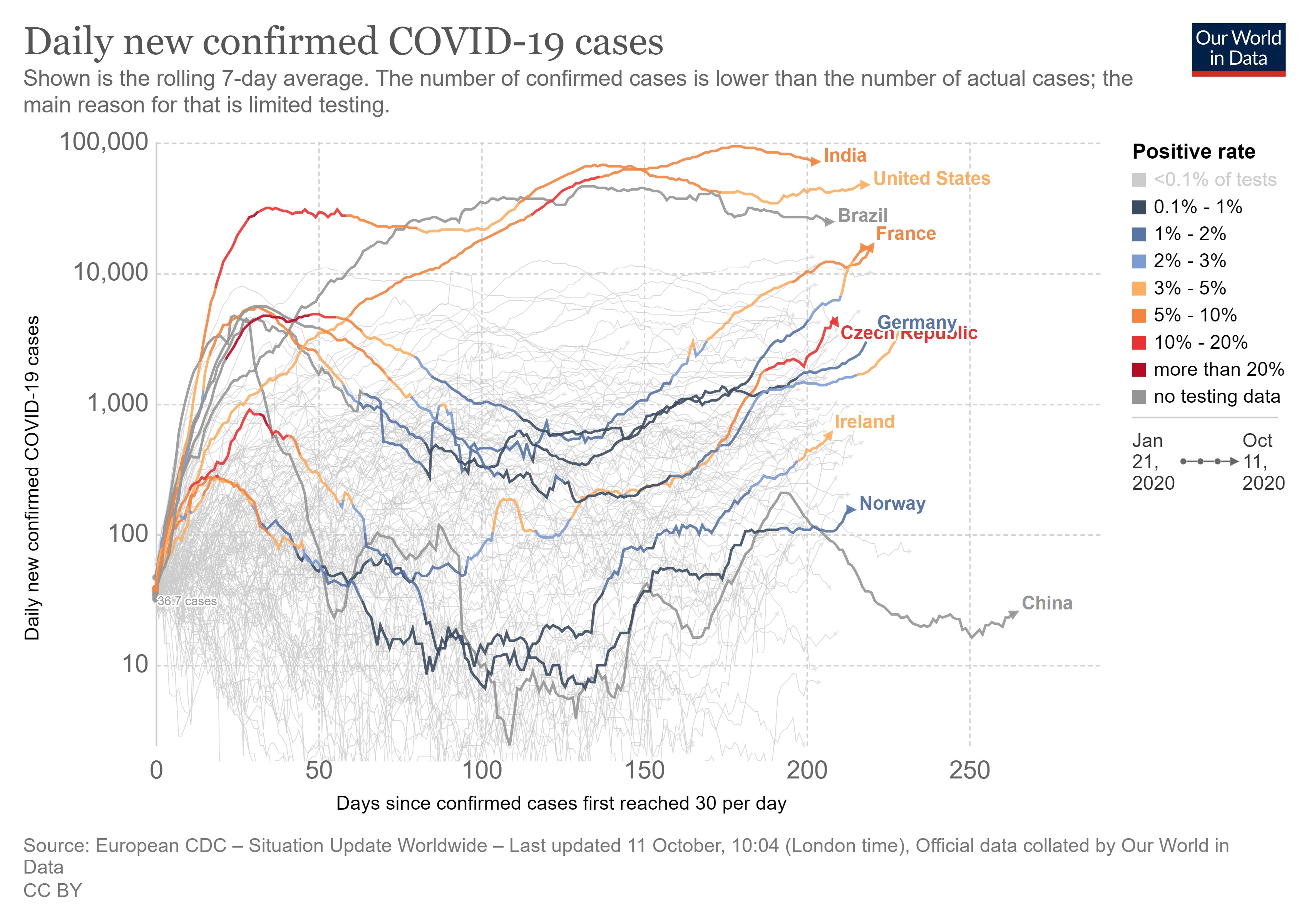COVID-19: What you need to know about the coronavirus pandemic on 12 October

Rafael Nadal lifts the French Open trophy in Paris – the city has been put on maximum alert as COVID cases rise. Image: REUTERS/Charles Platiau TPX IMAGES OF THE DAY - UP1EGAB19TO9X

Explore and monitor how COVID-19 is affecting economies, industries and global issues

Get involved with our crowdsourced digital platform to deliver impact at scale
Stay up to date:
COVID-19
- This daily round-up brings you a selection of the latest news updates on the COVID-19 coronavirus pandemic, as well as tips and tools to help you stay informed and protected.
- Top stories: Cases in India top 7 million; China to test city of 9 million; record daily rise in Russia and how the second wave is hitting Western Europe.
1. How COVID-19 is affecting the globe
Confirmed cases of COVID-19 have now passed 37.4 million globally, according to the Johns Hopkins Coronavirus Resource Center. The number of confirmed deaths stands at over 1.07 million.
In the US, confirmed cases have risen to 7,694,865, according to the Centers for Disease Control and Prevention (CDC), an increase of 53,363 cases from its previous count. The number of deaths rose by 577 to 213,614.
President Donald Trump said on Sunday he had fully recovered from COVID-19 and was not an infection risk for others. "I’m in great shape,” he told Fox News.
Cases in India have now topped 7 million, after the health ministry reported 74,383 new infections in the previous 24 hours. A rise in infections in southern states is offsetting a drop in western regions.
Asia-Pacific countries including Singapore, Australia and Japan are easing some international travel restrictions as coronavirus cases slow.
China’s Qingdao city will conduct COVID-19 tests for its population of more than 9 million people over five days, after new cases appeared linked to a hospital treating imported infections.
Deaths in Brazil have passed 150,000. It has the second highest death toll after the US. Confirmed cases stand at more than 5.09 million.
2. Record daily increase in Russia
Russia has recorded a new record increase in daily cases, pushing the world’s fourth highest infection tally towards 1.3 million, reports Reuters.
The country's coronavirus taskforce recorded 13,634 new cases in the last 24 hours, including 4,501 in Moscow. The death toll now stands at 22,597.
The capital has been the hardest-hit area. It has opened two temporary hospitals and ordered businesses to have at least 30% of staff working remotely.
In August, Russia became the first country to grant regulatory approval for a COVID-19 vaccine. Large-scale trials had not been completed, which caused concern among some in the global scientific community.
About 400 high-risk patients have received jabs, according to the health ministry, but the vaccine is not yet in general circulation.
3. Cases spike in Western Europe as second wave hits
A second wave of coronavirus infections is sweeping across much of Europe, while countries seek to bring in new restrictions without further damaging economies.
France recorded a one-day record number of cases on 10 October, with 26,896 infections. It comes just days after the capital city of Paris was put on maximum alert, with all bars closing but restaurants allowed to remain open.
Ireland also recorded a record daily increase over the weekend – with 1,012 new cases of COVID-19, almost double the average for the past week. Chief Medical Officer Tony Holohan said he was “very worried about the numbers we are seeing and how quickly they are deteriorating.”
Italy is preparing fresh nationwide restrictions, including on private parties, in response to a recent spike in new coronavirus cases, Health Minister Roberto Speranza said on Sunday.
Meanwhile, England's deputy chief medical officer Prof Jonathan Van-Tam warned the UK had reached a "tipping point". More than 15,160 people tested positive for coronavirus on 10 October, reports the BBC – an increase of more than 1,300 on the previous day.
Prime Minister Boris Johnson is expected to announce a three-tier local lockdown system which would see regions under different restrictions, depending on the severity of cases.
An aide to Chancellor Angela Merkel said Germany should continue capping the number of people allowed at gatherings and clamp down on unnecessary travel as it battles rising coronavirus infections.
“We must be a bit stricter in places where infection chains spread mostly, which is parties and, unfortunately, also travel,” the chancellor’s chief of staff, Helge Braun, told public broadcaster ARD.
Don't miss any update on this topic
Create a free account and access your personalized content collection with our latest publications and analyses.
License and Republishing
World Economic Forum articles may be republished in accordance with the Creative Commons Attribution-NonCommercial-NoDerivatives 4.0 International Public License, and in accordance with our Terms of Use.
The views expressed in this article are those of the author alone and not the World Economic Forum.
The Agenda Weekly
A weekly update of the most important issues driving the global agenda
You can unsubscribe at any time using the link in our emails. For more details, review our privacy policy.
More on Health and Healthcare SystemsSee all
Katherine Klemperer and Anthony McDonnell
April 25, 2024
Vincenzo Ventricelli
April 25, 2024
Shyam Bishen
April 24, 2024
Shyam Bishen and Annika Green
April 22, 2024
Johnny Wood
April 17, 2024






